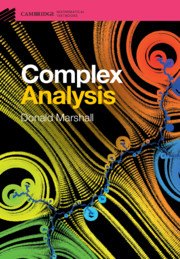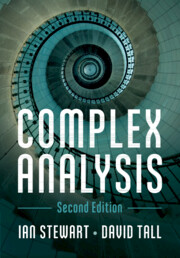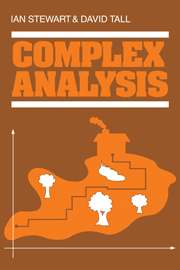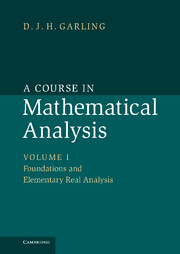Complex Analysis
$78.99 USD
Part of Cambridge Mathematical Textbooks
- Author: Donald E. Marshall, University of Washington
- Date Published: February 2019
- availability: This ISBN is for an eBook version which is distributed on our behalf by a third party.
- format: Adobe eBook Reader
- isbn: 9781108651851
Find out more about Cambridge eBooks
$
78.99 USD
Adobe eBook Reader
Other available formats:
Hardback
Looking for an inspection copy?
This title is not currently available on inspection
-
This user-friendly textbook introduces complex analysis at the beginning graduate or advanced undergraduate level. Unlike other textbooks, it follows Weierstrass' approach, stressing the importance of power series expansions instead of starting with the Cauchy integral formula, an approach that illuminates many important concepts. This view allows readers to quickly obtain and understand many fundamental results of complex analysis, such as the maximum principle, Liouville's theorem, and Schwarz's lemma. The book covers all the essential material on complex analysis, and includes several elegant proofs that were recently discovered. It includes the zipper algorithm for computing conformal maps, as well as a constructive proof of the Riemann mapping theorem, and culminates in a complete proof of the uniformization theorem. Aimed at students with some undergraduate background in real analysis, though not Lebesgue integration, this classroom-tested textbook will teach the skills and intuition necessary to understand this important area of mathematics.
Read more- Includes over 200 exercises, set at varying levels of difficulty to engage and motivate the reader
- Illustrates analytical functions with color figures to grant a high level of detail and accessibility
- Provides complete and detailed proofs and ties the subject with several other areas to give readers a comprehensive understanding of complex analysis and its applications
Reviews & endorsements
'Marshall's book covers the basic topics with crystal clarity in a style that is conversational and concrete, and that guides the student into thinking about these topics the way a working mathematician does, especially one with a geometric or computational bent. Moreover, the book includes many results that are vital to modern function theory and its applications to geometry, dynamics and probability, but that are often omitted from introductory texts. I wish I had first learned the subject from this book, and I am delighted that my students can do so.' Christopher Bishop, State University of New York at Stony Brook
See more reviews'This is an original and most welcomed new graduate text in complex analysis. Assuming only undergraduate real analysis and following the power series approach, it quickly and elegantly develops the basic theory through Cauchy's theorem for cycles, normal families, the Riemann mapping theorem, and the Weierstrass and Mittag-Leffler theorems. Unique aspects of the book include its many short, clever, and clear proofs of familiar results, the author's computational point of view about conformal mappings, a concise proof of the uniformization theorem from first principles (using the dipole Green's function for the parabolic case), and an excellent selection of exercises, some very thought provoking but having easy proofs.' John Garnett, University of California, Los Angeles
'There are essentially three points of view from which to begin the study of complex analysis, due principally to Cauchy, Weierstrass, and Riemann. These approaches emphasize integral formulas, power series and conformal mapping, respectively. Marshall has chosen to initially adopt the approach of Weierstrass and to emphasize at the outset the notion of a power series. From that point of view, many of the central ideas and theorems of complex analysis arise early in a rather natural way and are quite suggestive of what is true in a much wider context. One of the features of this book that distinguishes it from other texts is its emphasis on conformal mapping, culminating in a beautiful exposition of the Uniformization theorem for simply connected Riemann surfaces. From the outset, the exposition is placed in an historical context, is clear and concise throughout, and includes many new and interesting exercises.' James Brennan, University of Kentucky
'Written by a skillful teacher and grand master of complex analysis, this complex analysis graduate level textbook stands out from other texts through the clarity and elegance of the arguments, the efficiency of the presentation, and the selection of advanced topics. Each of the 16 chapters ends with a carefully selected set of exercises ranging from routine to challenging, making it an excellent textbook and ideal for a first-year graduate course. Marshall's choice of beginning with power series (following Weierstrass) has the advantage of a very fast and direct approach to some of the highlights of the theory. The connection to Cauchy's integral calculus, which is the starting point of most texts, is then made through partial fractions and Runge's theorem. This makes the book an invaluable addition to the complex analysis literature.' Steffen Rohde, University of Washington
Customer reviews
Not yet reviewed
Be the first to review
Review was not posted due to profanity
×Product details
- Date Published: February 2019
- format: Adobe eBook Reader
- isbn: 9781108651851
- contains: 68 colour illus.
- availability: This ISBN is for an eBook version which is distributed on our behalf by a third party.
Table of Contents
Preface
Prerequisites
Part I:
1. Preliminaries
2. Analytic functions
3. The maximum principle
4. Integration and approximation
5. Cauchy's theorem
6. Elementary maps
Part II:
7. Harmonic functions
8. Conformal maps and harmonic functions
9. Calculus of residues
10. Normal families
11. Series and products
Part III:
12. Conformal maps to Jordan regions
13. The Dirichlet problem
14. Riemann surfaces
15. The uniformization theorem
16. Meromorphic functions on a Riemann surface
Appendix
Bibliography
Index.
Sorry, this resource is locked
Please register or sign in to request access. If you are having problems accessing these resources please email [email protected]
Register Sign in» Proceed
You are now leaving the Cambridge University Press website. Your eBook purchase and download will be completed by our partner www.ebooks.com. Please see the permission section of the www.ebooks.com catalogue page for details of the print & copy limits on our eBooks.
Continue ×Are you sure you want to delete your account?
This cannot be undone.
Thank you for your feedback which will help us improve our service.
If you requested a response, we will make sure to get back to you shortly.
×









